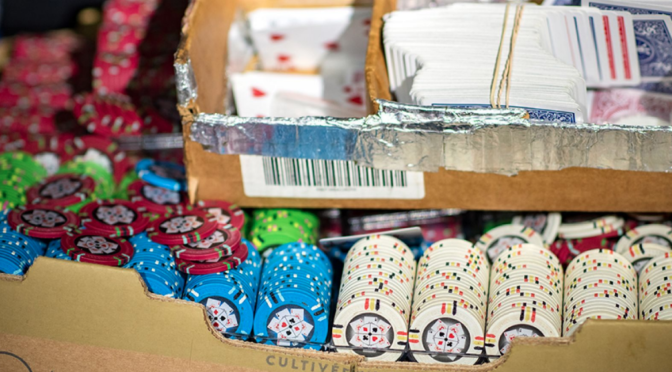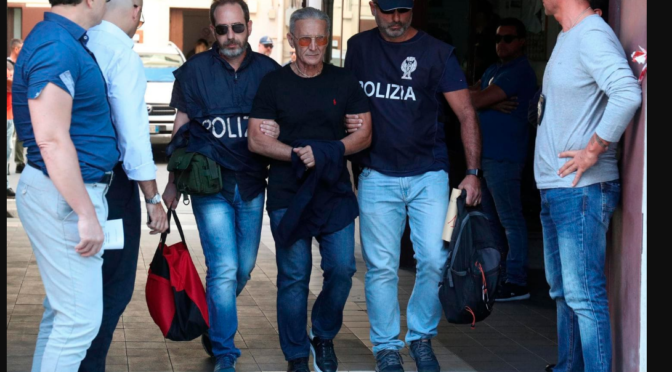Police in the U.S. and Italy recently arrested a number of mafiosi. NPR’s Lulu Garcia-Navarro asks author John Dickie about a trans-Atlantic criminal connection.
LULU GARCIA-NAVARRO, HOST:
The Mafia is back in the headlines in a series of raids involving the FBI and Italian police. Nineteen Mafia suspects were arrested in New York and Italy this past week; among them, some from the notorious Gambino crime family. John Dickie studies the Italian Mafia. He’s the author of “Blood Brotherhoods,” and he joins us now to talk about why these raids are significant.
Welcome.
JOHN DICKIE: Thank you. Thank you.
GARCIA-NAVARRO: Let’s start with these raids. What do you make of them?
DICKIE: Really, you have to begin the story back in the late 1970s when a number of Mafiosi with strong family ties and organizational ties across the Atlantic between Sicily and the eastern coast of the United States started trafficking in heroin in huge quantities. Now, in the early 1980s in Sicily, a group of Mafiosi who had been left out of that lucrative trade essentially mounted a kind of military coup de tar within the Sicilian Mafia in Sicily and either murdered or expelled from Sicily the members of the Gambino-Inzerillo family. And since then, they have been trying to make a return to re-establish that trans-Atlantic bridge.
GARCIA-NAVARRO: The families on the losing end of that turf war fled to the United States. Why the United States? And it seems strange that members of a crime family could find footing in the United States if they were known sort of Mafiosi.
DICKIE: We’ve really only begun to understand in recent years just how profoundly important – to the history of the Mafia since at least the very early 20th century – is this whole trans-Atlantic connection. This is not something that just happened once when millions of Sicilians emigrated to the United States before the First World War. This is an ongoing process, the toing and froing of criminal personnel, criminal commodities, criminal ideas. The Inzerillos and Gambino families are intermarried over several generations as part of this process.
GARCIA-NAVARRO: And so what happened recently is that members of this family who had fled to United States were then trying to go back and re-establish themselves in Sicily again. And it was leading to sort of a turf battle.
DICKIE: Yeah, that’s right. I mean, the return of the Inzerillos represents a huge internal political problem for Cosa Nostra in Sicily because the people who governed the Sicilian Mafia for a generation from the early 1980s were precisely the people who had murdered many of the Inzerillos, who had effectively ethnically cleansed the others out of Sicily and sent them back to the United States.
GARCIA-NAVARRO: So the Mafia survives off what it’s always survived off of, which is essentially protection rackets, right? But where are they at this particular moment? I think many of us think of the Mafia as being a sort of pale shadow of what it once was, both in the U.S. and Italy.
DICKIE: I think that’s true, but that is a great symptom of both the huge step change that there’s been since particularly the early 1990s in the law enforcement response to organized crime in Italy. And another great indicator of that is this trans-Atlantic cooperation between the authorities. They’ve now worked together for a generation because they understand the importance of this old bridge. It’s no coincidence that FBI headquarters has in it a bust of Giovanni Falcone, the great hero and martyr of the struggle against the Mafia in Italy. He was blown up, along, with his wife and his armed escort by a Mafia bomb in 1992 because Falcone was who pioneered this trans-Atlantic cooperation in the fight against the Mafia. He got it.
GARCIA-NAVARRO: Do you consider these raids are a major blow to the attempts to sort of reanimate these links?
DICKIE: I think this is an ongoing process. It clearly shows that the authorities are watching it very, very carefully. They understand it and know it. And that – from that point of view, it’s reassuring. But it’s always difficult to tell, when an operation is as fresh as this one is, just how damaging it will prove to be.
GARCIA-NAVARRO: That’s John Dickie, professor of Italian studies at University College London. Thank you so much.
DICKIE: Thank you.
(SOUNDBITE NIKLAS AMAN’S “ESCALATORS AND GLASS”)
Sourced From – https://www.npr.org/2019/07/21/743847214/19-mafia-suspects-arrested-including-some-from-the-gambino-family


